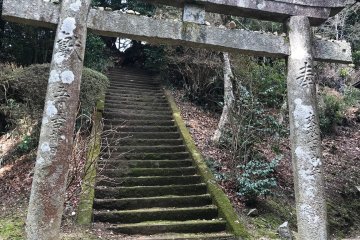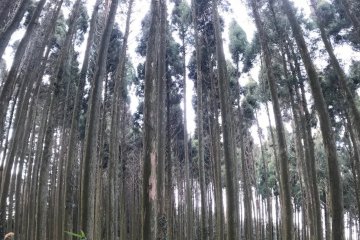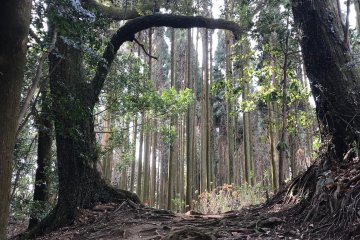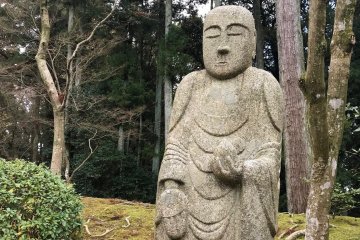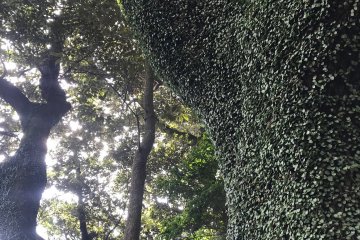Resting upon a scenic hilltop of northern Awaji-shima is the Joryu-ji Temple, a secluded Buddhist temple surrounded by the tall trees of Ise Forest. As we drove uphill along a lush, green, winding road, I felt as though I was transcending to a higher, more sacred place.
After parking, we were led along a green, mossy pathway towards a gate with two guardians on each side of the gate known as Niō. The gate had a large bell in the center, which the Buddhist monk on site told us to ring. The vibrations of the bell permeated throughout the surfaces of the space and cleansed our bodies, minds, and spirits. This act of ringing the bell prepared us and the site for our visit.
We then entered through this gateway, and transcended further up a flight of stairs to the temple entrance, sheltered by the beautiful branching structure of some deciduous trees. At the entrance of the temple building, we removed our shoes and stepped inside to see a magnificent display of the traditional Buddhist altar. The monk kindly offered us some of his incense to burn and pray with in the temple. He also allowed us to take photographs and encourage more of our friends to visit the temple.
After thanking the monk for his generosity, we proceeded to explore the space behind the temple building. There was another small temple building, and there also was a flight of stairs that led us to a scenic view of Awaji’s western coastline and the hillsides of which we were standing on.
The stairs led us to a short hike that contained many intertwining exposed roots on the pathway with moss growing on the trees. The forest floor had beautiful ferns and small plants thriving throughout the hike. We reached a few different viewpoints on top of the hill. The view was lovely and unique. Since we were in a temple environment, the view increased the intensity of the sacred essence among us. The view was a wonderful conclusion to our trip to Joryu-ji Temple.
Temples throughout Japan are a contribution to the spiritual well-being of many. Those who set their intentions, hopes, and dreams in their prayers in a temple setting have manifested positive energy for the rest of their day, week, and year. Religious practices at temples may not be a daily practice for many Japanese people, but temple culture is shared among all Japanese people. As a visitor to Japan, I feel as though I have connected with Japanese cultural practices. Although many temples in Japan share the same purpose, the Joryu-ji Temple offers a unique experience through the surrounding landscape of the Ise Forest and the scenic views of Awaji’s western coastline.












